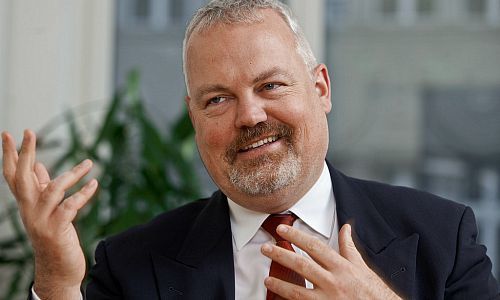An independent sovereign wealth fund would be economically and politically useful to Switzerland, UBS chief economist Andreas Höfert believes. However, a former UBS top manager has expressed serious reservations.
«Sovereign wealth funds are an excellent means to exert influence,» UBS economist Andreas Höfert (pictured above) claims, in an interview with the NZZ am Sonntag (article in German) newspaper published on Sunday. «A sovereign wealth fund could help Switzerland in the new negotiations on the bilateral accords.»
To begin with, bold investment in foreign exchange reserves would weaken the franc, Höfert argued. The Swiss National Bank (SNB) already holds a part of its reserves abroad. But the bank is too hesitant on this score, says the UBS economist.
Invest in the property sector?
Höfert continues: «It would be possible to go into non-liquid markets with higher returns. Why not the property sector?» Six of the ten largest state funds are operated by countries that export no raw materials, he points out.
«It is nonsense to say that a country can only set up a sovereign wealth fund when it possesses raw materials,» Höfert says.
Not such a smart idea
Adriano Lucatelli (pictured below) takes an opposing view. Former managing director at UBS, he currently works as a consultant and senior lecturer at the University of Zurich. Recently he also expressed his views on the question of whether Switzerland should augment its foreign exchange reserves in a sovereign wealth fund, concluding that such a move would be fraught with problems.

Unfortunately the idea has more disadvantages than may be apparent at first glance, Lucatelli wrote in a recent highly regarded essay. «While it’s true that the SNB would have the resources to establish such a fund, under its official remit it has other goals than running an investment fund.»
Artificial debt
«Monetary policy has absolute priority, which basically means that the SNB’s investment policy must be subordinate to the requirements of monetary policy. Any limitation on the SNB’s room for monetary manoeuvre would be dangerous, and could seriously jeopardise its monetary policy efficiency,» the former UBS banker stated.
He also doubted the demand for foreign exchange would weaken the franc to any great extent. «Investors would soon see through the game of creating artificial debt to introduce a SWF [sovereign wealth fund], and position themselves accordingly,» Lucatelli said. In contrast to other countries, new money printed by the SNB would be used for investment rather than consumption. «Unlike the hypothetical Swiss fund, other countries finance their SWFs primarily with surplus revenues from exports of commodities such as oil and gold.»
Exploited by politicians
Lucatelli warned that sovereign wealth funds have another weakness – they are open to abuse because they inspire «political covetousness». On the one hand politicians could be tempted to use profits generated from foreign investments for political ends, on the other hand they might try to exert greater influence over the central bank, which should by definition be independent.
Citing the example of the Norwegian parliament, which has «misused» the country’s sovereign wealth fund to implement its climate policy, Lucatelli added: «Against this backdrop it’s fair to assume that any Swiss version of a sovereign wealth fund would also run a high risk of bad investment and negative returns.»
Firm rejection
When investing in foreign currencies, the SNB’s priority has to be liquidity and security, Lucatelli concluded, «unlike ‹real› sovereign wealth funds whose focus is on generating market returns.» For this reason the idea of a Swiss sovereign wealth fund must be firmly rejected, he said.


































